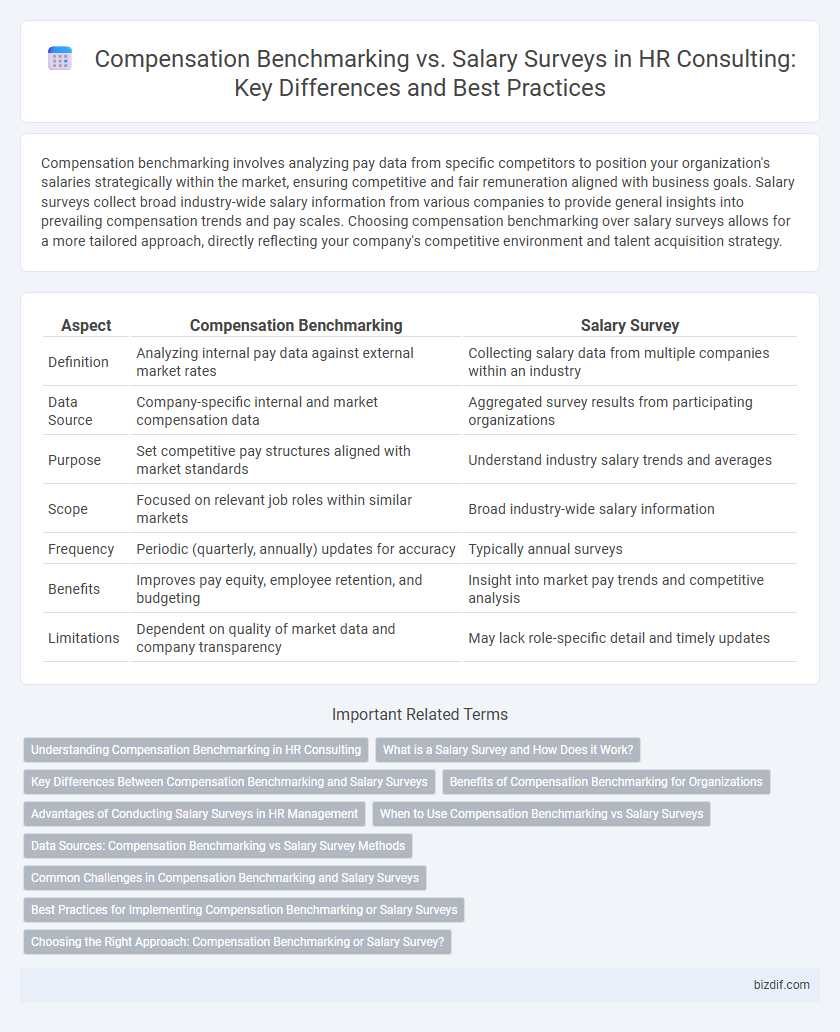Compensation benchmarking involves analyzing pay data from specific competitors to position your organization's salaries strategically within the market, ensuring competitive and fair remuneration aligned with business goals. Salary surveys collect broad industry-wide salary information from various companies to provide general insights into prevailing compensation trends and pay scales. Choosing compensation benchmarking over salary surveys allows for a more tailored approach, directly reflecting your company's competitive environment and talent acquisition strategy.
Table of Comparison
| Aspect | Compensation Benchmarking | Salary Survey |
|---|---|---|
| Definition | Analyzing internal pay data against external market rates | Collecting salary data from multiple companies within an industry |
| Data Source | Company-specific internal and market compensation data | Aggregated survey results from participating organizations |
| Purpose | Set competitive pay structures aligned with market standards | Understand industry salary trends and averages |
| Scope | Focused on relevant job roles within similar markets | Broad industry-wide salary information |
| Frequency | Periodic (quarterly, annually) updates for accuracy | Typically annual surveys |
| Benefits | Improves pay equity, employee retention, and budgeting | Insight into market pay trends and competitive analysis |
| Limitations | Dependent on quality of market data and company transparency | May lack role-specific detail and timely updates |
Understanding Compensation Benchmarking in HR Consulting
Compensation benchmarking in HR consulting involves systematically comparing an organization's pay packages against industry standards to ensure competitive and equitable salaries that attract and retain talent. Unlike salary surveys that collect raw pay data from various companies, benchmarking analyzes this data in the context of company size, location, and job roles to tailor compensation strategies. Accurate benchmarking empowers HR professionals to design pay structures aligned with market trends, regulatory compliance, and organizational goals.
What is a Salary Survey and How Does it Work?
A salary survey is a data collection tool used by HR professionals to gather information on employee compensation across various organizations within an industry or region. It works by collecting detailed salary data, including base pay, bonuses, and benefits, from participating companies, allowing employers to compare their pay structures against market standards. This process helps businesses make informed decisions on competitive compensation packages, ensuring talent attraction and retention in the marketplace.
Key Differences Between Compensation Benchmarking and Salary Surveys
Compensation benchmarking involves systematically comparing an organization's pay structure against industry standards to establish competitive salary ranges, while salary surveys gather raw data on actual compensation practices across companies. Benchmarking offers strategic insights tailored to a company's specific roles and market positioning, whereas salary surveys provide broader quantitative compensation information without customization. Understanding these distinctions helps HR professionals design effective pay strategies that align with business goals and market competitiveness.
Benefits of Compensation Benchmarking for Organizations
Compensation benchmarking provides organizations with precise market-aligned salary data, enabling competitive pay structures that attract and retain top talent. It facilitates data-driven decision-making by comparing internal roles against industry standards, reducing turnover and enhancing employee satisfaction. Leveraging benchmarking insights helps optimize compensation budgets while maintaining equity and compliance within the workforce.
Advantages of Conducting Salary Surveys in HR Management
Conducting salary surveys provides HR management with accurate market data to ensure competitive and equitable compensation packages, enhancing talent acquisition and retention. These surveys deliver detailed insights into industry pay standards, allowing organizations to adjust salaries based on current trends and benchmark positions effectively. Utilizing salary survey data helps prevent pay disparities, fosters employee satisfaction, and supports compliance with labor laws.
When to Use Compensation Benchmarking vs Salary Surveys
Compensation benchmarking is ideal for aligning pay structures with industry leaders when setting strategic salary levels or revising compensation frameworks to attract top talent. Salary surveys provide comprehensive market data useful for understanding current salary trends and maintaining competitive pay within specific roles or regions. Organizations should choose compensation benchmarking for tailored internal consistency and salary surveys for broad market insights.
Data Sources: Compensation Benchmarking vs Salary Survey Methods
Compensation benchmarking relies on curated internal and external data sources, including industry reports, company financials, and third-party compensation databases to establish competitive pay structures. Salary surveys gather primary data directly from participating organizations, providing real-time insights into salary distributions, benefits, and total compensation packages within specific markets or job categories. Combining benchmarking with salary survey methods ensures robust, data-driven compensation strategies aligned with market trends and organizational goals.
Common Challenges in Compensation Benchmarking and Salary Surveys
Compensation benchmarking and salary surveys often face challenges such as data accuracy issues, sample bias, and inconsistent job matching across organizations. The rapidly changing labor market and industry-specific variations complicate the comparability of compensation data. Ensuring data relevance, regularly updating survey inputs, and aligning job roles precisely remain critical hurdles for HR consultants conducting meaningful compensation analysis.
Best Practices for Implementing Compensation Benchmarking or Salary Surveys
Effective compensation benchmarking relies on selecting relevant peer groups and utilizing up-to-date, industry-specific salary survey data to ensure accurate market positioning. Best practices include defining clear job roles, analyzing total compensation components beyond base salary, and regularly updating benchmarks to reflect market fluctuations. Leveraging robust data analytics platforms enhances decision-making accuracy, aligning compensation strategies with organizational goals and talent acquisition efforts.
Choosing the Right Approach: Compensation Benchmarking or Salary Survey?
Compensation benchmarking involves analyzing internal pay structures against industry standards to ensure competitive and equitable salaries, while salary surveys collect external market data to guide compensation decisions. Selecting the right approach depends on organizational goals, data accuracy needs, and budget constraints; compensation benchmarking offers precision for tailored strategies, whereas salary surveys provide broad market insights. HR consulting firms recommend combining both methods to optimize pay competitiveness and retention in dynamic labor markets.
Compensation benchmarking vs salary survey Infographic

 bizdif.com
bizdif.com